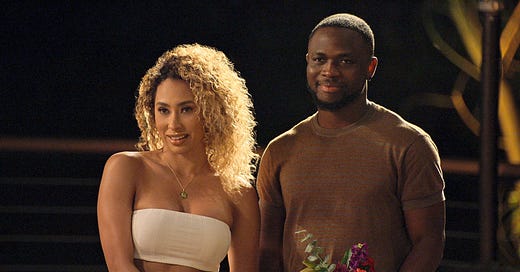Have you ever watched Love is Blind? If you’re not aware of this Netflix series, "Love is Blind" is a reality dating show where singles attempt to find love and get engaged without ever seeing each other, by going on dates in isolated "pods" where they can only hear each other's voices. Once engaged based solely on emotional connection, the couples finally meet in person. They then go on a vacation, move in together, and must ultimately decide whether to actually get married or break up at the altar, putting the idea of love being blind to physical appearance to the test.
I have watched all six seasons. For some, like myself, the experience is laced with irony, a kind of meta-commentary on the very nature of the content being consumed. Others partake in such media with a sincere earnestness, unironically absorbed by the spectacle. And others watch it because it’s so bad that they perceive it as good. Think of it as when watching a bad movie that makes you say, “Wow, this is so bad, that it’s good.”
I’m not here to judge your reasons for watching or not watching reality television, and despite watching all of the seasons, I do have a few issues with “Love is Blind.”
The Main Issue
While the premise of the show may purport that "Love is Blind," the producers are anything but. By this, I mean that an overwhelming 98% of the contestants, across all six seasons, are individuals who conform to society's standards of physical attractiveness—fit, toned, and conventionally appealing. In other words, they are not a real representation of the average person. Most of the contestants are people who spend not an insignificant amount of their time at the gym and watching what they eat. The narrative, therefore, transforms into a meticulously crafted spectacle, representing an idealized aspiration rather than a genuine exploration of love untainted by physical appearance.
To be clear, the practice of casting attractive and fit individuals is a hallmark of most, if not all, dating shows. However, this tendency becomes acutely ironic and troubling in the context of "Love is Blind," given that the show's central premise is predicated on the notion that love should transcend physical appearance—suggesting that, indeed, love is blind. If this were genuinely the case, one must then question why every cast member epitomizes conventional standards of attractiveness. If an emotional connection alone is sufficient to foster genuine love, why does the casting department insist on populating the pods with individuals who could easily pass as professional models?
On one hand, the casting might be intended to subconsciously reassure participants in the pods that their eventual partner will be visually appealing, subtly undermining the show's foundational thesis. On the other hand, this selection caters to the audience's desire for visual allure, allowing viewers to enjoy the spectacle of attractive individuals navigating the complex emotional terrain of love. I think it’s a combination of both.
**Also, in this essay I’m not even getting into the premise of the show, which is to actually and legally marry someone you barely just met.**
Is Love Truly Blind?
The short answer, it seems, is no. For love to initially develop, physical attraction often plays a pivotal role. You even see it in the show, where people who form a deep connection by having conversations, agree to get married, but when they meet in person for the first time, one of them realizes that the spark is not there. It’s clear that while emotional and intellectual compatibility is essential, physical attraction remains a significant component of romantic love
As I mentioned, keep in mind that most of the people in the show look like models and yet, the attraction is not always there despite their emotional bond being strong.
Everyone has a different definition of what they find physically attractive, but whatever that may be, it’s important. You must find the other person physically attractive. An emotional connection is not enough. Physical attraction is not enough for a relationship. Both are necessary.
Obviously, attraction can grow over time, and as you enter a committed relationship, that person then becomes more attractive than anyone else to you. That’s important for longevity, especially as your youth begins to fade. Still, that initial attraction is important, especially in the beginning of your relationship.
Ideally your partner becomes more and more attractive to you because their personality and the way they show their love becomes more meaningful to you.
So, love is not blind, but maybe it’s nearsighted.
Unrealistic Expectations
Does watching super fit people affect the way you feel about yourself? A study by the Mental Health Foundation found that shows like ITV's Love Island contribute to body anxiety in young people, with nearly one in four saying that reality TV makes them concerned about their body image.
I go to the gym often and I have a healthy self-image, but to be honest, there are times where I feel some anxiety if I dare to entertain the idea of comparing myself to the guys with the six-pack abs on the show.
Speaking of mental health, reality TV shows with toxic behavior like verbal aggression, manipulation, and narcissism can increase these negative traits in viewers, especially younger ones who may not distinguish between reality and fiction. Studies found that after watching reality shows with relational aggression, participants showed more aggressive behavior compared to those who watched family-friendly or scripted violent shows. This effect is stronger for children who struggle to see the difference between entertainment and reality. Surveys revealed that many viewers, especially younger ones, see the dramatic scenarios and relationships in reality TV as real and normal behavior, supporting the Cultivation Theory of media influence.
The Cultivation Theory, developed by George Gerbner and Larry Gross, suggests that long-term exposure to media, especially television, shapes viewers' perceptions of reality. The theory posits that the more time people spend watching TV, the more likely they are to believe that the real world reflects what they see on television. This can lead to a distorted view of reality, where viewers adopt attitudes and behaviors seen in TV shows.
The Lawsuits
Love is Blind has encountered significant legal challenges as former contestants allege mistreatment, abuse, and illegal practices by the production companies involved. Here are the key points regarding these lawsuits:
Renee Poche's Lawsuit
In January 2024, Renee Poche, a contestant from Season 5, filed a lawsuit against Netflix and Delirium TV. Her allegations include:
Forced Relationship: Poche claims she was coerced into continuing an emotionally abusive relationship with fellow contestant Carter Wall, who allegedly displayed "erratic and alarming behavior" and had addictions to drugs and alcohol.
Seizure of Personal Belongings: She asserts that the production staff confiscated her phone, passport, and driver's license, effectively keeping her confined to a hotel room during filming.
Arbitration and Penalties: After voicing her negative experiences, Delirium initiated arbitration against her for breaching a non-disclosure agreement (NDA), demanding $4 million in penalties despite her earning only $8,000 from the show.
Restrictive NDA: Poche's lawsuit also argues that the NDA unlawfully restricted her from discussing workplace conditions and threatened her with excessive penalties.
Tran Dang's Lawsuit
In October 2023, Season 5 contestant Tran Dang sued Kinetic Content, Delirium TV, and her former fiancé Thomas Smith, alleging:
Sexual Assault: Dang claims that Smith sexually assaulted her while filming in Mexico.
False Imprisonment and Neglect: She further alleges that producers falsely imprisoned her and neglected their duty to ensure her safety.
Jeremy Hartwell's Lawsuit
In June 2022, Jeremy Hartwell, a contestant from Season 2, sued Netflix, Kinetic Content, and Delirium TV for various labor law violations, including:
Restricted Freedom: Hartwell asserts that contestants were not allowed to move or act freely during production.
Hefty Penalties: He also claims that contestants faced a $50,000 penalty for breaching their contracts or attempting to leave the show.
Broader Concerns
These lawsuits shed light on several troubling aspects of the show's production:
Exploitation of Cast Members: The allegations point to the exploitation of contestants, who were allegedly subjected to harsh and restrictive conditions.
Neglect of Mental Health and Safety: The claims highlight a disregard for the mental health and safety of participants.
Silencing Through NDAs: The use of restrictive NDAs appears to have been a tactic to prevent contestants from speaking out about their negative experiences.
The common thread in these legal actions is the portrayal of a production environment that prioritizes dramatic content over the well-being of its participants. The allegations of forced relationships, restricted freedoms, and severe penalties paint a grim picture of what some contestants endured during and after their time on the show.
What Now?
Despite all of this, I’ll probably still ironically watch the upcoming seasons. To be clear, I don’t usually binge watch this show. After a couple of episodes, I usually take a break. It all becomes too much at times. The contestants and the decisions they make get on my nerves at times, even when I’m making fun of the whole thing.
I also watch it because reality TV sometimes serves an escape from actual reality. What I mean by that is that sometimes it’s nice to have a moment when I don’t have to think too much about life’s troubles. If I had a long and stressful day, it feels cognitively pleasing to watch something that doesn’t demand too much from me. Obviously, this is okay in small doses. This would not be healthy if taken to an extreme.
How about you? Do you watch trashy reality TV shows, if so, why? And if not, why not?
Thank you for reading. If you've enjoyed this deep dive and found it insightful, please consider upgrading your subscription. Your support allows me to continue producing in-depth analyses and thoughtful content. By subscribing, you'll gain access to a wealth of exclusive posts, crafted specifically for our dedicated community of readers.
Sources and Further Reading:
https://sitn.hms.harvard.edu/flash/2017/love-actually-science-behind-lust-attraction-companionship/
https://www.mentalhealth.org.uk/about-us/news/mental-health-foundation-criticises-new-series-love-island-it-releases-new-statistics-about-body
https://au.rollingstone.com/tv/tv-features/reality-tv-affecting-mental-health-48925/
https://psycnet.apa.org/record/2016-54177-001
https://www.swlondoner.co.uk/entertainment/06052021-research-shows-reality-tv-is-not-harmless-entertainment
https://www.newyorker.com/magazine/2024/05/27/is-love-is-blind-a-toxic-workplace






